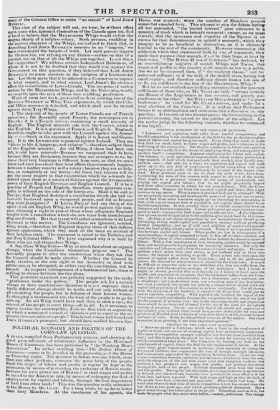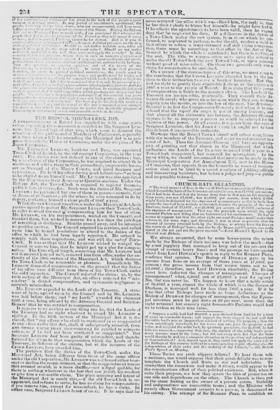POLITICAL ECONOMY AND POLITICS OF THE CORN-LAW QUESTION.
A TaAcr, compiled from Parliamentary returns, and showing the great preponderauce of aristocratic influence in the Retie rued House of Commona, has been published by " the Workieg Meics Association." Its rather startling title—The Rotten House of Commons—seems to be just& d by the proceedings of the House on Thursday night. The question in debate was one which, more than any other perhaps, concerns the great body of the people. Shall the wages of labour and profits of capital be kept at the minimum, by means of preventing the exeliange of British manu- factures for corn grown out of Biltain ? or shall wages and profits be rinsed to the American rate, by means or enlarging the field ot employ meet for capital and labour, through the free importation of food from other lands? This was the question really submitted to the House by Mr. Una.e. For a long while, be spite to fewer Than forty Members. At the conclusion of his speech, the House was counted ; when the number of Member() present some%% bat exeetled forty. This attempt to stop the debate hating all but succeeded, " the landed interest" gave utterance to a quantity of trash which is beneath comment ; except, as we must remark. that the ignorance and stupidity of the Squires is no excuse for their determination to uphold a motiopol, whirl* they irnagine to be as beneficial to themselves, as it is obviously hurtful to the rest of the community. however unmeaning the gibberkh which they stammered forth by e..ay of argument, they made their purpose clear enough, if wa by their lingo, at least by their votes. "The Rotten H. use of Commons" has declared, by an overwhelming majority of united Whigs and Tortes. that wages and profits in this comitry shall remain as low as p seible„ Are we to he surprised then, if " the working classes** call for universal suffiage; or if the bulk of the middle class, having but small capitals. and therefore suffering deeply from a low late of pr fit, ale indifferent to the fate of the NletoinuRxe AV higs?
Bid let us not overlook one striking exception from the ignorant sellislinees of those elle, US Mr. VI too i-Rs said, " occupy eidirely one house or the Legislature in this country, and greatly pre- ponderate in the other.- Sir WILLIAM MOLlisWORTH is " a great landowner:** he voted for Mr. Caporcs ) ti )) it, awl spoke for a total abolition Of the Corn-laws. It is seldom that Parliament listens to so philosophical and statesman-like a discourse oil any question. It consists of two distinct parts; the first relating to the political economy, the second to the politics of the subjeet. Let the reader judge by the following extracts, whether we ronuneed it too highly.
l'OLITICAL ECONOMY OF TUE CORN-LASE QUESTION..
" Labourers and capitalists both suffer from Lurtftil c petition ; and hurtful competition is the consequence of the field lot the prieluctive employ- ment of labour and capital being too small. Every thing that tends to make that field too small, tends to liver wages and profits, and is injurious to the well-being of the community. But there is a tendency in labour mid email to augment more I mildly thin the means of employing them, alid conseq trendy to work re hurtftd competition. Augment employment for labour and capital, (for instance. hy some agticultural improvement, which renders productive a large quantity of land whieh had previously been sterile), then hurtful com- petition eras, • —but only fur a time ; for population and capital tvill both grow up to the new field of employ anent ; hurtful competition will :again exist ; and wages and profits will ultimately be lir.verell to the former stan- dard. These positions seem to me to show the evils of the Coin•laws. Considering the state of this country with regard to the rest of the world, there might be a perpetual increase of the means of productively em- ploying our capital and labour; that is, we might perpetually impott food from other countries in return for our manufactures. This the Corn- late prevents. Suppose the Corn•law repealed rapital and Wm ir then night increase to any extent What matters it provided food can he obtained? With our perpetually increasing and inexhaustible powers of purchase, our iinootta- tion of food front other countries might go on increasing for generations, 4:1 that, with a great increase both of population and capital, there should he no hurtful competition. Iu this country there is a hurtful competition bettveen labourers and between capitalists. Labour and capital are superabundant com- pared to land ; consequently both wages and profits ate low. A free importa- tion if corn would be equivalent to the addition of so much land to this coun- try. As long as our means of purchase by our manufacturers should pi on increasing, so long miyht capital and population increase without producing hurtful competition ; just us if with each addition of capital and popula- tion, the land of this country were increased. There is an important distinc- tion between capital and labour. When profits are low in consequence of a superabundance of capital compared to land, it flies off to other countries, and employs the labour if other countries. and leaves behind the domestic excess itf labour. With a free importation of food, increasing capital would be invested here, and would provide employment for increasing labourers. Not only the capitalists and labourers suffer from the excess of capital and people. The com- petition which arises front that excess, is nut confined only to those two classes; for interest is according to ptofit. Every person who lives triton the interest of capital suffers from the Corn laws ; and so do the professional classes, the demand for whose services is limited Its the Corn-laws. It would be difficult to name the class or the individual who does not suffer from the Corn laws, with the exception. pethaps, of the landowner. Anil I think it might be shown, piovided that ret.t depends (as I believe it dues) upon the wealth awl population of a country, that the landowner suffers front the Corn- laws; for the e is not a manufacturer, nor a shipowner. nor a merchant, nor a shopkeeper, nor a professional man, our a wurkiug man of any description, nor even a landlord, who would not gain by a ehange which should allow the capital and population of this countty to increase courinually. For all classes, with the exception of the landlord, a repeal of the Corn. laws would put an end to injurious competition. With regard to the landlutil, the repeal of the Corn-laws uould undoubtedly decrease the competition for the use of his land for the purpose if growing own ; but in the iticteasing wealth RIM populatmn there would be an increared demand thr the use of his land fir an infinite pariety of purposes. No one can doubt that if the wealth and population of this country were doubled, there would be a greater demand fir the uses and produetsigr English land exclusive of corn, than there is at the present moment inclusive ,;1* corn. So far for the political economy of the subject. But tilers is another more pressing, if not mote important question."
POLITICS OF THE COUN.LAW QUESTION.
" Since we passed a Corn-law, which sets a limit to the employment of cipital at home, our ineaus of creating capital have prodigiously augmented. The cause of competition amongst capitalists has beCIMIC 1110Ie powerful thins ever ; and this is precisely the period we have chosen for Iiinittng the richt in which competition Likes place. The ('orn- law, by lunitmg our field tor the employment of capttal, limits the field fur the employment of labour. At the Maine time, great improvements in medicine, ueure especially in curing the diseases of children, have augmented the rate of increase gst laborers, and consequently aggravated the competition between them. ii race the wry severe competition between capitalists and labourers, whichever :dace the war, with the exceirion of the last two years (and this exerptien confirms this positium) has produced low wages, low profits, and political discontent amongst the bulk of tile people. Political discontent arose nem tow wages and low profits. Dut mg the last two years, great improvements in agriculture in Iteland, and extraordinary hat vests, have produced the same effect as if the Corn•laws had been repealed. With high wages and high profits, the bulk of the people have beer contented arid pedee.ible. This cannot last long. We must soon return to that state of severe competition which has existed slfWe the war down to two years ago, and which produces political discontent. But a great moral change has takeu place in the pt-tile. Education, such us it is, has made the people what they never were before,—namely, politicians. The change o t■ e um!. ti l'ariiatnent has given to the buhk of the people a great inemse powee. In any period of cansideratle excitement, the people. fle !IT 07.-• w ii 11'..•.,. who are unrepresented, will have great
reline ot.. t! e. i•!ci n and devisioun ef this Boone. Baring the Belot m
);P!' • "V;:• ; I. iv to work with. I em convinced rehtnercr the rot h. rr• '4.- 7 -,ere cf the Corn-low they will sweep it away at ; a!v! :s1 l•• It, cannot be fir distant. But is it wise to tool:, 7 r.t. i. cv.le again feel that pressure, and be in a *coy nht we not rather legislate now, when all is qui, I, t vvi!`:-7' s;o:nt which must arise? Should we not rather t, I, v it c;.;!. than wait and eirrly the remedy? In this 1:1114,1■, ;.7 r there is such an immense piworttil, of towo ,•; ' • ! • ;117 •tr I may say, upon confidence nod credit.
Is.ow 11: • t, •
Vey:.
Tile
i
• t..!:vi u nd Jest I net tve, and can hardly be borne. :.!..r vpiniorn, and cf tie power of the :t; l.' ID fader to make t hat progrenn contolsions, the petnhe roust be ag.a jul profits must be high ; evil :;.movtal which tends hurtfoliy to I:mit the e;.nvineed that it is only Ti, nicat.,s of a re- t.scherets of colanization.that Mc field for
and capital can he cootinnolly
'Gluon which prodders low wages and low ion and capital of this country nay go VII WrIgra awl high profits ; and the nation . first step to -his desit able result is a al of this law in requited an one amongst ;Ire I, (.1-••-•;111'y to render the inevitable pulp ess of notin.ey a aLand iwacealde as it is in Ainet•ica.'



























 Previous page
Previous page